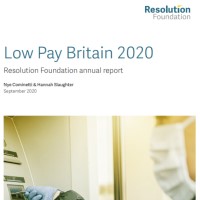Report: Low Pay Britain 2020
The Resolution Foundation highlights that the current situation creates a challenging and highly uncertain environment in which to set minimum wage policy. The Low Pay Commission (LPC) would have expected to be raising the National Living Wage (NLW) by around 50p this year. Instead, a lower uprating of around 15p is more likely. But this is still consistent with sticking to the longer-term aim of ending low pay by 2024.
Key findings
- Before the crisis, the rising National Living Wage was driving down low pay. In 2019, low pay (the number of people earning below two-thirds of median hourly pay) fell for the sixth consecutive year, falling from 17% of employees in 2018 to 15.5% in 2019, the lowest rate since 1978.
- The nature of the crisis, with the impact concentrated on the sectors which provide face-to-face services, means the economic impact has been felt most heavily by the low paid. In June, employees earning below the real Living Wage were around twice as likely as higher-paid earners to have lost their job, been furloughed, or lost hours and pay as a result of the crisis. Low-paid workers have also faced greater health risks.
- The 2024 target to end low pay has an in-built flexibility. If the pandemic has a lasting negative effect on productivity and pay, this will be reflected in a lower nominal target for the minimum wage.
- Alongside a rising wage floor, other policies to improve the lives of the low paid are needed. Improvements should include better access to (and improvements to the generosity of) sick pay, more control over hours and shifts, and wider access to and better enforcement of existing rights.







